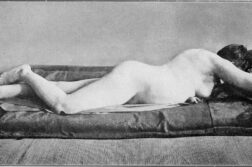MY COPY of Susan Sontag’s Against Interpretation is forty years old and was published by Dell for 95¢. It was a time when literary criticism could be sold as a mass market paperback. A photo of Sontag takes up most of the cover. She is young and pretty, the skunk-like swatch of white not yet streaking her helmet of hair. She is wearing a jacket that covers her to her chin, and yet there is nothing doughty about her. It’s the look of a French intellectual, or rather a New York intellectual who has spent a long time in Paris. She does not stare at the viewer, but glances back over her shoulder as if someone is calling her—a female Orpheus trying to ignore the cries of an underground Eurydice.
Against Interpretation is not unrelated to Marshall McLuhan’s work that insists that the media is the message, that how a work communicates is what a work communicates. “The idea of content,” Sontag informs her reader, “is today mainly a hindrance, a nuisance, a subtle or not so subtle philistinism.” Philistinism is the important word, suggesting a moral criticism of Matthew Arnold, one that both shaped her and caused her to react. Her entire life was spent casting stones at the Philistines, slingshot in hand.
Sontag’s most famous essay—the penultimate essay in Against Interpretation—is her “Notes on Camp.” When I was editing a collection of essays on camp, Camp Grounds, I wrote to Sontag asking to reprint it and got a huffy letter back from a secretary telling me that she would not allow the essay to be reprinted and not to bother her again. The letter is itself an example of camp by its outrageously bluestocking refusal. Like the characters in The Twentieth Century, Sontag had closed the iron doors on me.
The essay is the opposite of camp. For if, as she argues, camp is failed seriousness, “Notes of Camp” is failed frivolity. It tries very hard to be light and gay, but is incapable of achieving the proper triviality.
Sontag sets out to mark Camp like some colonial governor trying to bring order to unruly natives. I’m thinking of the missionary in Maria Montez’s Cobra Woman (1944). She writes, “I am strongly drawn to Camp, and almost as strongly offended by it. That is why I want to talk about it, and why I can. For no one who wholeheartedly shares in a given sensibility can analyze it; he can only, whatever his intention, exhibit it.” The native Camps can’t really explain their own sensibility; it takes the sympathetic but objective eye of a colonizer to analyze the local practices. The closet was the perfect position to acquire authority and to escape philistinism, and she maintained that open secret throughout her life.
It is a pity that she didn’t explore further her finest insight into camp: “Being-as-Playing-a-Role,” but it would have led her to a level of self-revelation that she appears determined to evade. For example, she speaks about Jews and homosexuals as “the two pioneering forces of modern sensibility,” yet she never lets on that she is both Jewish and homosexual (perhaps because it would jeopardize her ability to analyze such sensibilities). Her diaries are also about Being-as-Playing-a-Role. Although its pages extravagantly reveal her dirty linen to the public, she maintains a careful eye that they hang with just the right theatrical flare.
I met Sontag only once. I was introduced to her as someone who had Divine over for dinner while she was filming Desperate Living in Baltimore. Sontag strode over and took my hand. “What was she like?” she asked with the conspiratorial air of a true fan. “She ate a lot, and was as polite as a Catholic school girl,” I answered. She let my hand drop. “Just what I feared,” she answered, and said not another word to me the whole evening.
David Bergman, poetry editor for this magazine, is the editor of the 1994 book, Camp Grounds: Style and Homosexuality.





